With COVID-19 in our lives, artists express what others cannot.
How to articulate the sudden thirst for life, the fear of death, the insanity of another day awaiting for news of tomorrow when tomorrow is uncertain? How to articulate the daily acts we cope with between dying and living?
When we could not articulate any of that, we looked to those who could and tried: Artists. Their music, their writing, their painting, their poetry, their voice. Their work was and continues to be healing, soothing, cathartic, and at times as painful as the reality we live in. But isn’t that what we look for in art? Answers. Questions. An expression we struggle to find in ourselves.
Since the COVID-19 pandemic’s arrival in Kosovo, artists have struggled too, to stay afloat. With galleries, exhibitions and cultural events canceled in Kosovo and abroad, international exhibitions and artistic programs were either off the table, postponed, annulled, or reshaped into a virtual sphere that just isn’t the same. While some cultural projects moved on against all odds, adapting to pandemic times, artists too were cut off from their income, of contact with loved ones, of the necessary exchange with others that feeds work. That feeds art.
In the midst of this life and death scenario painted over our heads, which we have now incorporated into our daily life as a normal aspect of the everyday, some artists turned to their art to make sense of the reality — or the delusion — they found themselves in. Reviving past traumas, confronting the possibility of death, surviving the everyday, finding life in the small details, coping with loneliness in the monotony of lockdown, choosing life over survival, are some of the themes that artists put into their work over the past year.
K2.0 spoke to five artists — musician Liburn Jupolli, poet Nora Prekazi, painter Rron Qena and contemporary artists Driton Selmani and Doruntina Kastrati — about what this year has been like, with some of the artwork produced since March 2020 that articulates the crisis and hints of life inside the pandemic.
Longing with Liburn Jupolli
COVID-19 quarantine caught Liburn Jupolli, one of Kosovo’s most progressive musicians, in France, where he was working on the music for a play based on Fyodor Dostoyevsky’s “The Dream of a Ridiculous Man,” featuring Arben Bajraktari and Dennis Lavant under the direction of Simon Pitaqaj.
In the play itself, written in 1877, César Award nominee Lavant, has a line about the plagues in human history, to which he added coronavirus at the premiere in Paris in 2020, getting a laugh out of the audience, while there was still an audience. “It was a crazy cathartic use of the situation,” says Jupolli at a cafe in Prishtina one year later, “nobody knew yet what was going on.”
Lockdown arrived in France on March 16, with initial closings of schools and universities. It was the beginning of more than two long months stuck in Paris for Jupolli, at a friend’s apartment, while his dog and girlfriend were thousands of kilometers away in Prishtina. “It was almost three months of living in a laptop,” he says, while recollecting the memories of a 24/7 virtual life.
The pandemic’s quarantines and strict traveling regimes across the European continent caught many by surprise, despite the warnings coming from the East. Couples and both given and chosen families were suddenly separated, with airplanes parked and borders closed down. Jupolli spent two months in France, and another bit of isolation in Switzerland before finally making it to Kosovo.
Unlike Dostoyevsky’s drama that he put music to, which narrates the tale of a man who loses belief in the world’s value and plans to end his life, a lockdown far away from his Kosovar home pushed Jupolli into an unbeatable sense of longing, a longing out of love.
“I had never in my life missed Kosovo as much as I missed Kosovo during these three months,” he says now.
Jupolli experienced a very strict lockdown in France, with numbered walks to the grocery store, and then a more relaxed time in Switzerland where he was hosted by an Albanian family friend, in a home in the countryside.
“For me it’s been a time for growth, for acceptance, reorganization and reflection, for not just surviving but putting things into perspective for the future.”
Baffled by the news of death and the reduction of the pandemic to numbers during those first months of 2020, Jupolli speaks of an overwhelming sadness that is hard to face through a musical piece he has not yet dared to write. But he emphasizes the necessity of giving a humanistic response on an artistic level to what this historical event has brought us.
The musician, known for his love of experimentation and innovation, sees this time as an opportunity to contribute to what he describes as “a chance to test the future.” In art, that is, in his words, “an opportunity to contribute to this change in the creative industry while also keeping our humanity alive within this new system.”
This has been a very hectic year for Jupolli, with plenty of work on the books, and collaborations with other artists. But while still away from his loved ones during a period when nobody really knew how long the quarantine was going to last; stranded in Paris and Switzerland and armed only with a laptop to channel his creativity, Jupolli’s most personal creations during this time as a COVID-refugee turned out to be love songs for his partner. A human act after all, if not the most human act. “For me, all this stemmed from love for my people, love for life.”
Sea Ride (draft)
Reflections on death with Nora Prekazi
When COVID-19 knocked at our doors a year ago, the thought of death became more present than ever before. Death was on TV, on the news, in the daily reports by the National Institute of Public Health, and at some point it was also at our neighbors’ home, in the same building, and even within our families.
People got sick, and feared the worst. People didn’t get sick, and also feared the worst, except the skeptics. But when death is a real possibility, the fear of it can be almost as life-changing and disrupting as death itself.
For some artists, the possibility of death was close to home. More than 1,700 people have died in Kosovo due to COVID-19 since March 2020. Over 78,000 people in Kosovo have been infected with the virus. In June 2020, one of them was Faton Prekazi, the brother of Mitrovicali poet Nora Prekazi.
The poet had just arrived from an artistic residency at the Moderna gallery in Ljubljana when lockdown threw everyone into their homes. Prekazi spent the lockdown with her husband and two young children at their apartment in Mitrovica. And when life seemed to be gradually going back to normal, her brother got seriously ill from COVID-19 staying 26 days in the hospital. It was the beginning of the summer infection peak.
In the hours of uncertainty waiting for her brother to recover, Prekazi turned to a rarer expression of her poetry, often lyrical although at times resembling the work of American poet Raymond Carver, to pour out her state of desperation and pain.
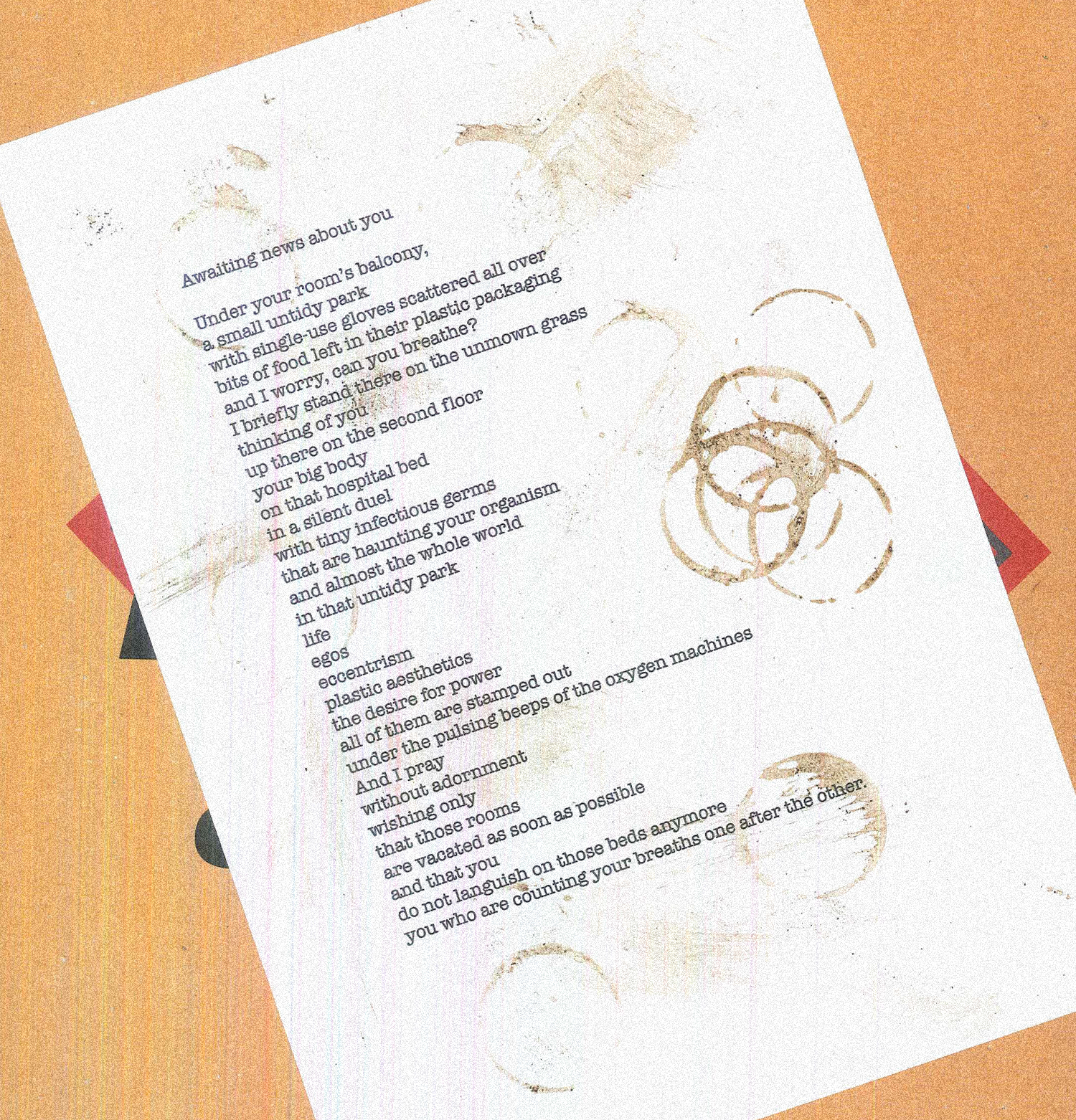
The poet recalls the time spent in the garden of the Infectious Disease Clinic, waiting for her brother to be removed from the oxygen machine and leave the hospital. “It was very painful when I was at the hospital and I was down there, in this closed area, and the environment was so bad. I was in agony hearing all these people with COVID, coughing. And you understand how little we are. When the moment comes to confront death, nothing is important anymore, everything falls down.”
Nora’s experience at the Infectious Disease Clinic in Prishtina didn’t end there. Soon after her brother recovered her father got sick and was hospitalized with COVID-19, the poet was his caretaker and companion in the clinic for 13 days.
“For me trauma is the war in Kosovo in 1998-1999 and COVID” says Prekazi, “these are two traumas that are the same, because we were in direct confrontation with death.”
Despite all the valleys, the pandemic year has been a hive of life for Prekazi too, as she managed to pull together the first edition of the Zana literary festival. For the first time, the festival gathered poets from North and South Mitrovica, adding to the numerous cultural activities in Mitrovica and the virtual sphere.
Like those from war, Prekazi says, the faces and names of people she met during this COVID-19 crisis at the hospital won’t ever be forgotten. And after a year of near-death experiences that came too close to home, it is the small details of life that continue to be present in her poetry.
Survival in disbelief with Driton Selmani
On the second page of Driton Selmani’s small red notebook, the first of many he would write in with short poems, statements and sketches during the first weeks of COVID-19 quarantine, the artist stated: “Trauma alters the very structure of what is simulated as reality.” A year later, he can’t remember what brought him to those lines, but his artwork speaking to the delusion of those days piles up in the corners of his blue studio in the center of Prishtina.
During lockdown, Selmani was at his apartment in Prishtina with his wife and two young children. “It was the same as being in the Cirque du Soleil and having the same audience everyday,” says the artist, who indeed during the first days of the pandemic, became an acrobat at keeping minds active, his own included.
Plastic bags became the frame again for Selmani’s visual and narrative art, but this time he also turned to paper, scissors and glue to capture the monotony and illusion of COVID-19’s early days through short poetry bits that he put onto posters — a visual diary of his impressions in tweetable length.
The colorful verses stamped a la collage over cheap cardboard paper speak to the economics of lockdown, as these were likely the only materials to be found in supermarkets, one of the few essential businesses allowed to work through March, April, and May 2020.
The pandemic’s essentials did not only affect the aesthetics of Selmani’s art — with what materials were available — but it went a little deeper under the layer of one of Selmani’s most powerful tools: His humor.
“My humor was attacked a lot,” says Selmani, “it has become darker, more direct and content-wise is heavier.” The mix of naiveté, ambivalence and sarcasm that characterized Selmani’s short poems takes a more direct shape in many of the home artwork produced from March 2020 on.
Indeed, one of the biggest take-aways of COVID-19 for many is that it is no longer possible to ignore reality. And for Selmani, that translated into loosening up his humor for more direct expression. “It had a lot of impact, I didn’t become a fortuneteller but I felt like going into a confessional everyday. On some occasions there is no humor, it is straightforward what I thought.”
Reading snippets from Selmani’s notebooks, posters and plastic bags one finds the seeds to his thoughts with reflections speaking to the illusion that comes with surviving trauma, the questioning of reality, the loss of a sense of time, and the apathy of one more day in disbelief.
“Survival is violent & seeks cruelty.” “The borderline between people & animals is blurred.” “Once upon a time a beautiful day really existed.” “Illusion is a strategy for the survivor.” “Life is more provocative than me.” “Pleasure mixed with anxiety.” “What to do with all this silence?”
With cathartic free jazz as a musical soundtrack to his lockdown months, Selmani turned to his visual snippets as a way to register the algorithm of a present time.
“Our suffering is unpredictable,” says Selmani. “Today I am here and I think about the future, but I have an archive. You reflect on this and every word you produce is an algorithm you produce out of experience. For me it was very important to register this.”
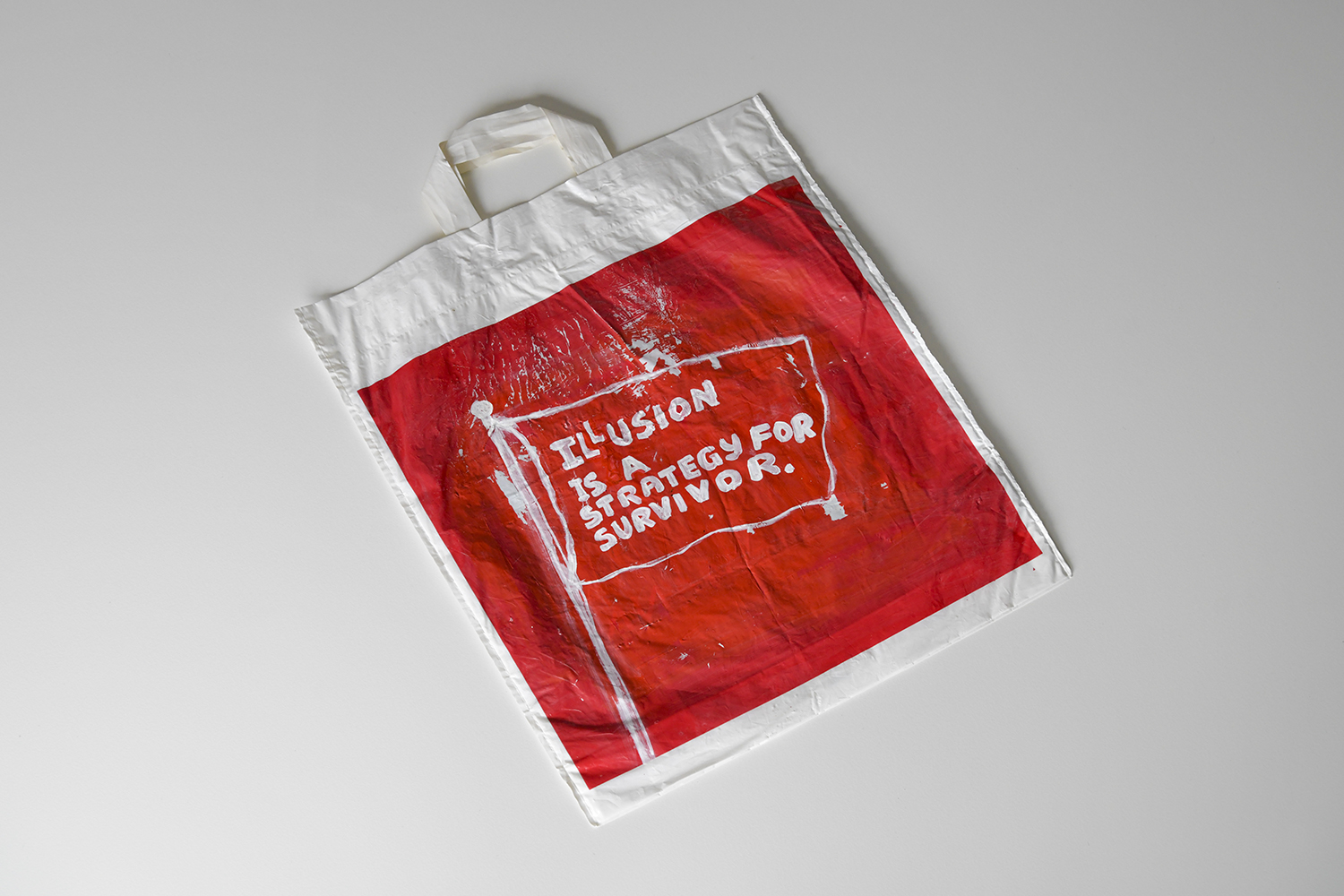
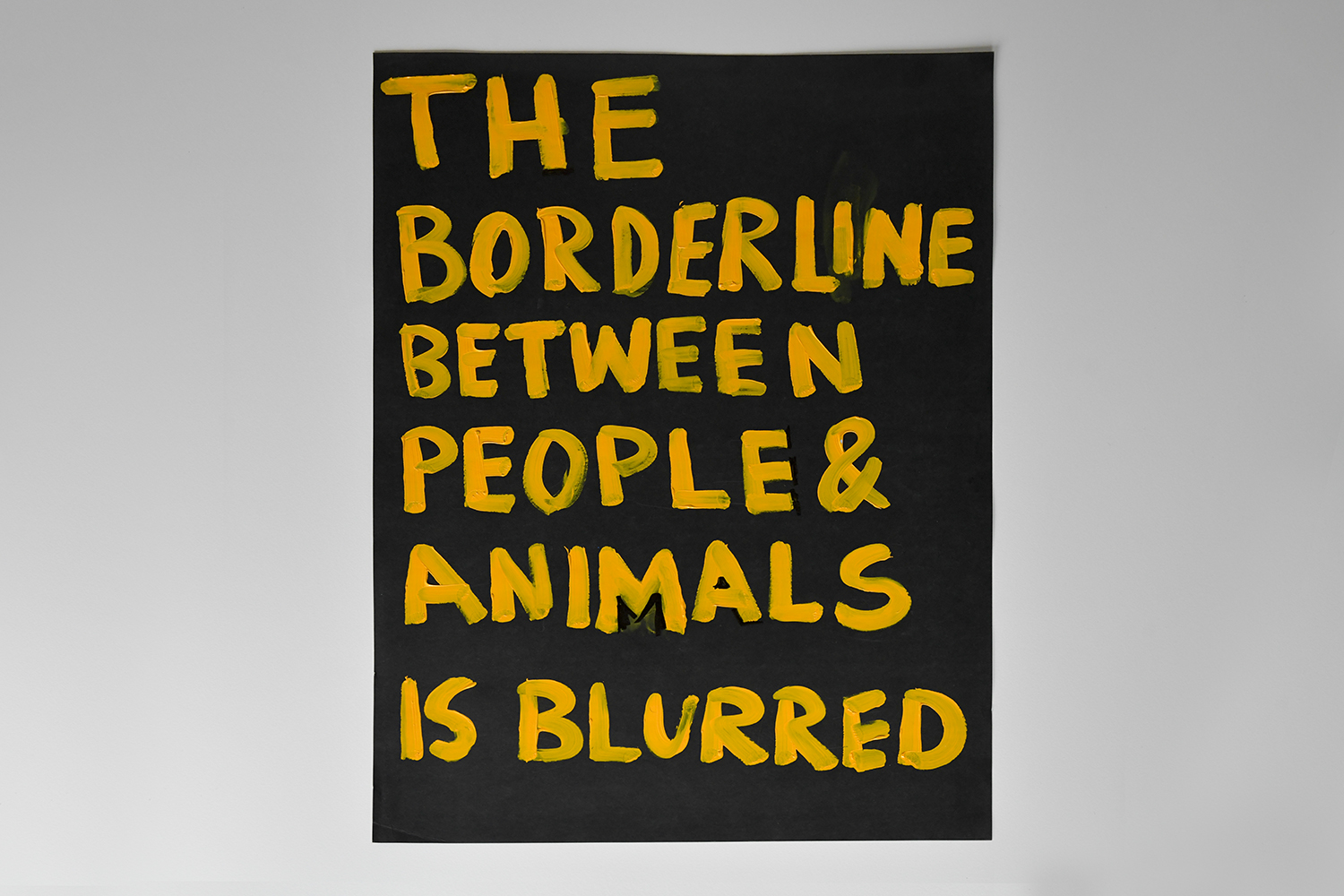
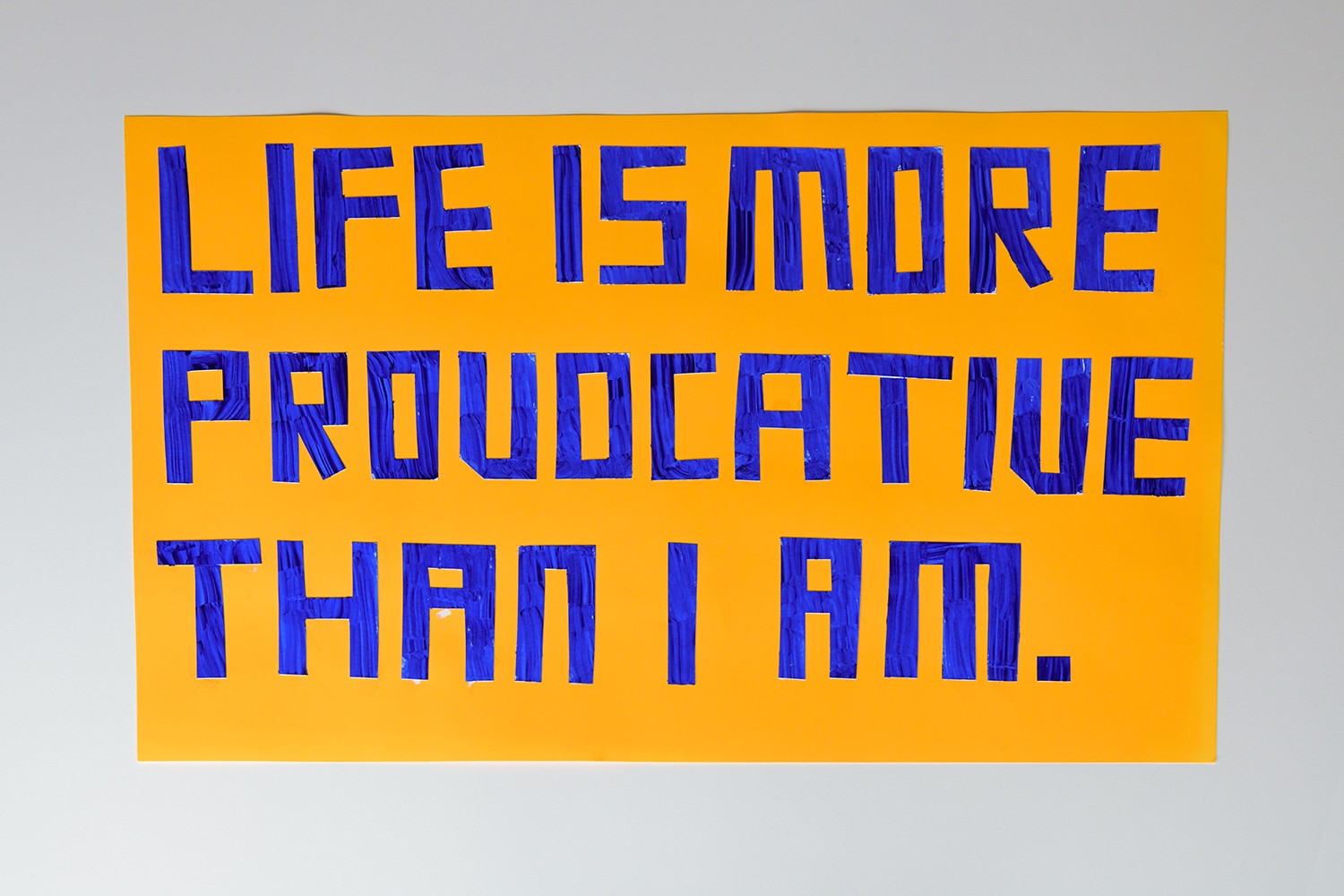
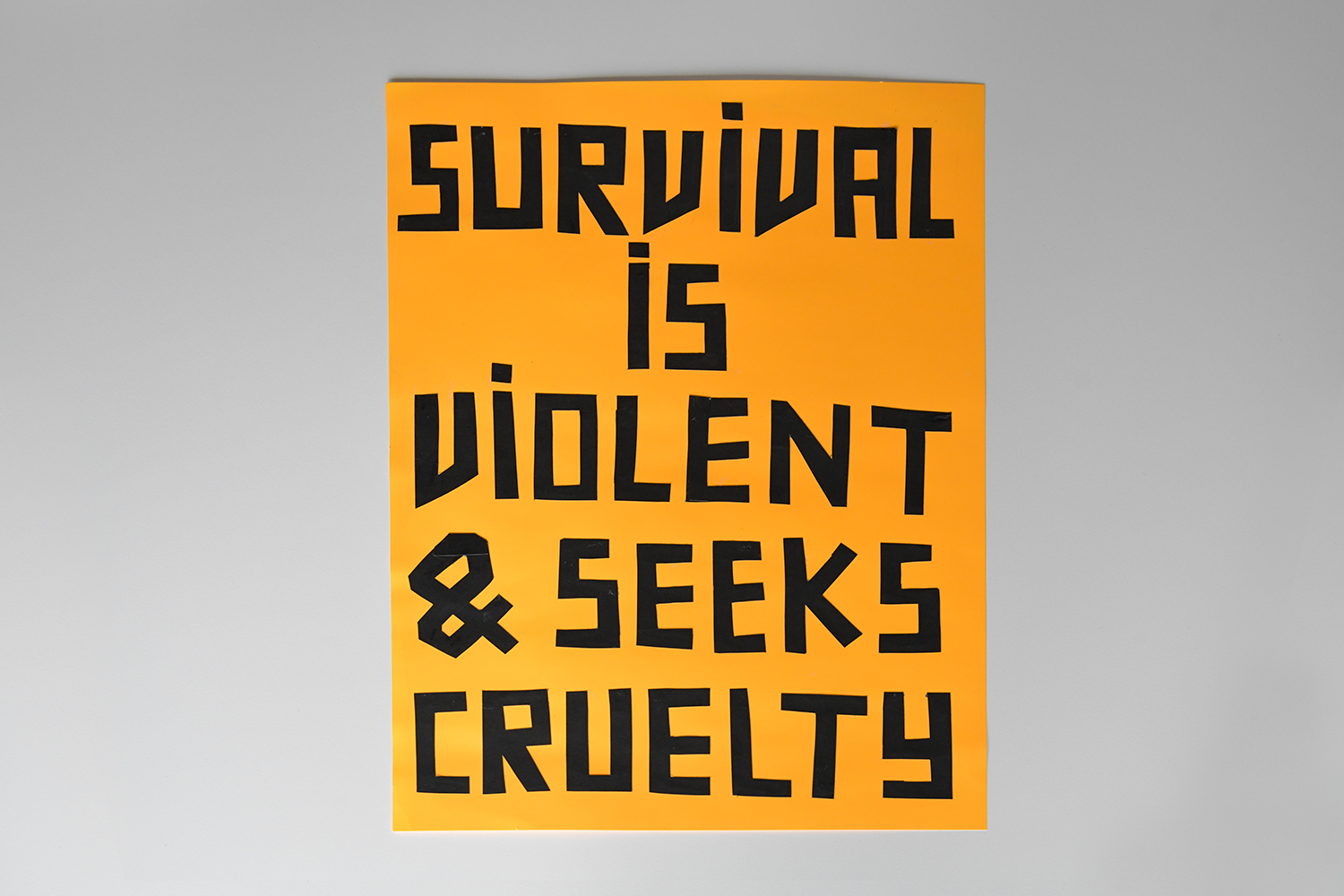
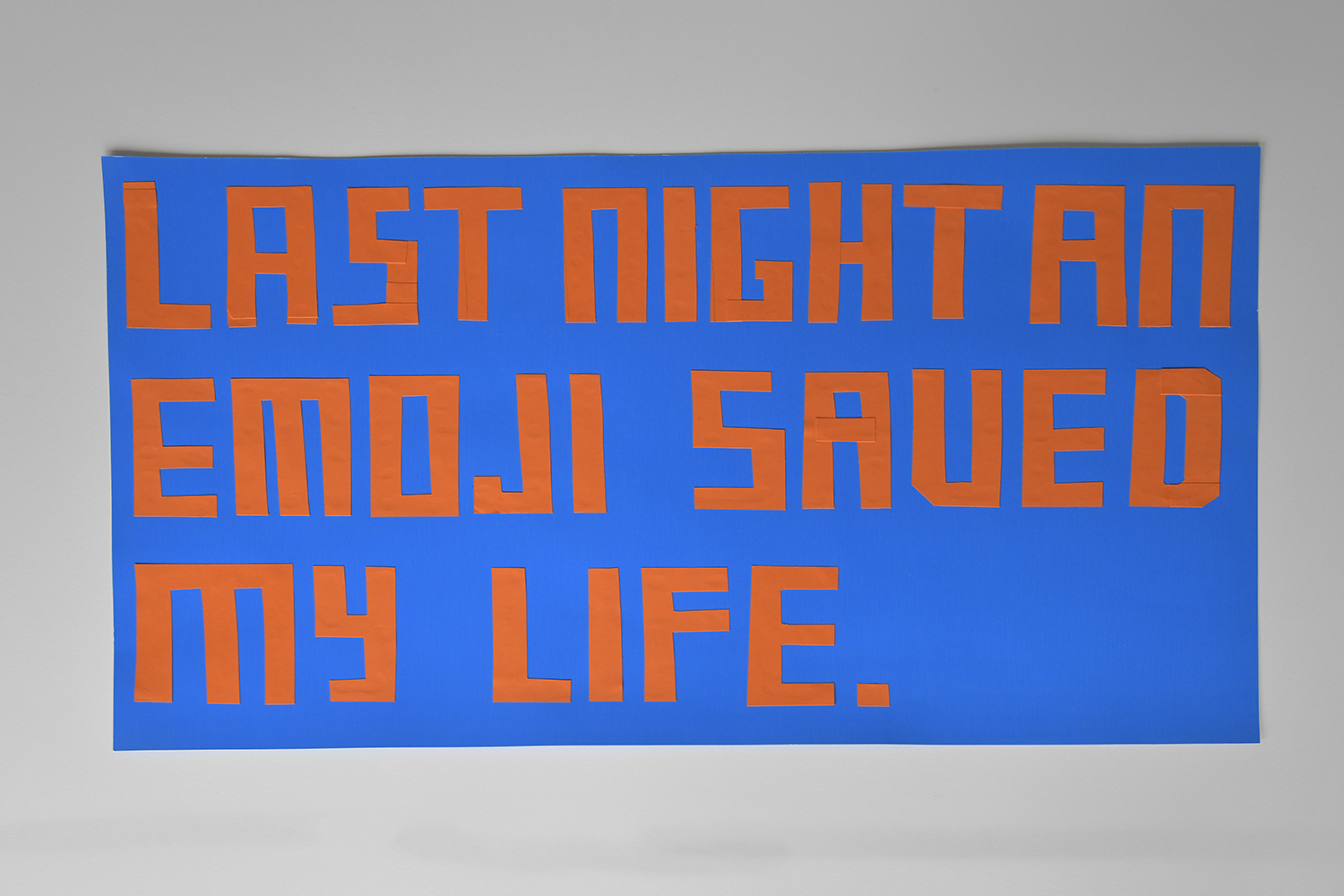
Highlighted inequalities with Doruntina Kastrati
Supermarket cashiers, bread makers, cleaners, trash collectors, gas station employees. These are only some of the essential workers that during the 2020 COVID-19 lockdown were made visible, for once.
For weeks, workers once relegated to the last row of the wage scale suddenly became some of the most essential responders to a global crisis.
But the pandemic only highlighted all sorts of inequalities for workers and for many outside of the working force who couldn’t even access employment. It was hard to unsee the reality that once was lost in the daily acts of inertia that keep the system going. The situation in Kosovo wasn’t different.
But for artist Doruntina Kastrati exploitation is part of her home’s history too. Kastrati’s mother used to work in a lokuma factory about 12 hours a day for a wage of about 1.50 euros per day. “From up close I saw through my mum what a maximized exploitation of the working class is,” says the artist. For some years now she has been researching worker exploitation, making it a central topic of her current work.
The pandemic lockdown in March and April caught Kastrati in the midst of recording a short documentary film looking into experiences of workers employed at the Betelenka company, contracted by the government for the “Highway of the Nation” construction that connects Albania and Kosovo, and the highway connecting Kosovo and North Macedonia.
In the film, Kastrati interviews workers who suffered accidents at work that forced them out of work.
“I was interested in this exploitation of the working class, and their exclusion from work without any security,” says Kastrati. “Now they are disabled, and their families have no income, so if they don’t work the whole family has no food.” The pandemic pushed those who already lived in the margins toward the absolute edge. “When we speak to them in interviews they tell us how ‘we are without a job, but now in the period of pandemic we are dead in a way.’”
Through the artistic project Kastrati shows testimonies of workers at the Betelenka company who either suffered accidents and were left without any sort of social scheme or compensation to hold on to.
Unlike others in this piece, Kastrati’s artwork was not a pandemic production, but it became one, and one more relevant in the context of growing scarcity in Kosovo, where the lack of social policies and employment were already a bad combination.
During the first months of the quarantine, thousands of new families requested social support from charities like the Red Cross or public institutions. The inequality many lived in was only increased by the increase of people in need.
At the beginning of lockdowns Kastrati and her team, together with curator Hana Halilaj and filmmaker Leart Rama visited some of the points nearby Prishtina’s Bill Clinton boulevard where daily workers gather and wait for a car in need of extra hands for the day.
“People were fixing their gardens, doing renovations … So for 10 days or so until the police blocked them, daily workers were still gathering, hiding behind some buildings — but then, they disappeared.”
“This situation made it worse for them. The conditions were already bad before the pandemic, they were already lost, and this just destroyed them.”
Living, with Rron Qena
In the early days of the pandemic Rron Qena thought to himself if this is going to be it, I have to put all of this life in a painting.
For a man used to the loneliness of his studio, a pandemic was only a deadlier pretext to spend the hours painting confusion away. “We’re quite lonely in our studios,” says Qena, “but we need society, because we do our work so that somebody else can see this.”
I ask Qena about the struggles of creating under the pressure of an apocalyptic scenario: “My father [artist Agim Qena] used to say people should learn to play with themselves. This is the first thing in life.
If you feel good with yourself, if you just have pencil and paper, then the outside world will be easier because you have something to show, and I wanted to have something for myself to show. This made me want more, and to perfect myself, and also to try to find beauty if it’s really hard to see it.”
The pandemic presented itself as a reminder of the past, of the war, in a way, once again, a confrontation with death. But in the background was the city he had painted before, under a layer of smoke, almost faded away by its chaos; Qena started enjoying painting Prishtina again in full color. “What happened with Prishtina is something beautiful because we started to hear the birds, there weren’t cars or as many people and it felt again just as the city should be.”
In that element, where Qena finds beauty in the confusion, he painted a memory of a time or many times spent with his girlfriend by the canal in Berlin. The painting re-imagines the reflection of those shared moments by the river, the memory and that thirst for life accentuated by an excess of paint over the canvas.
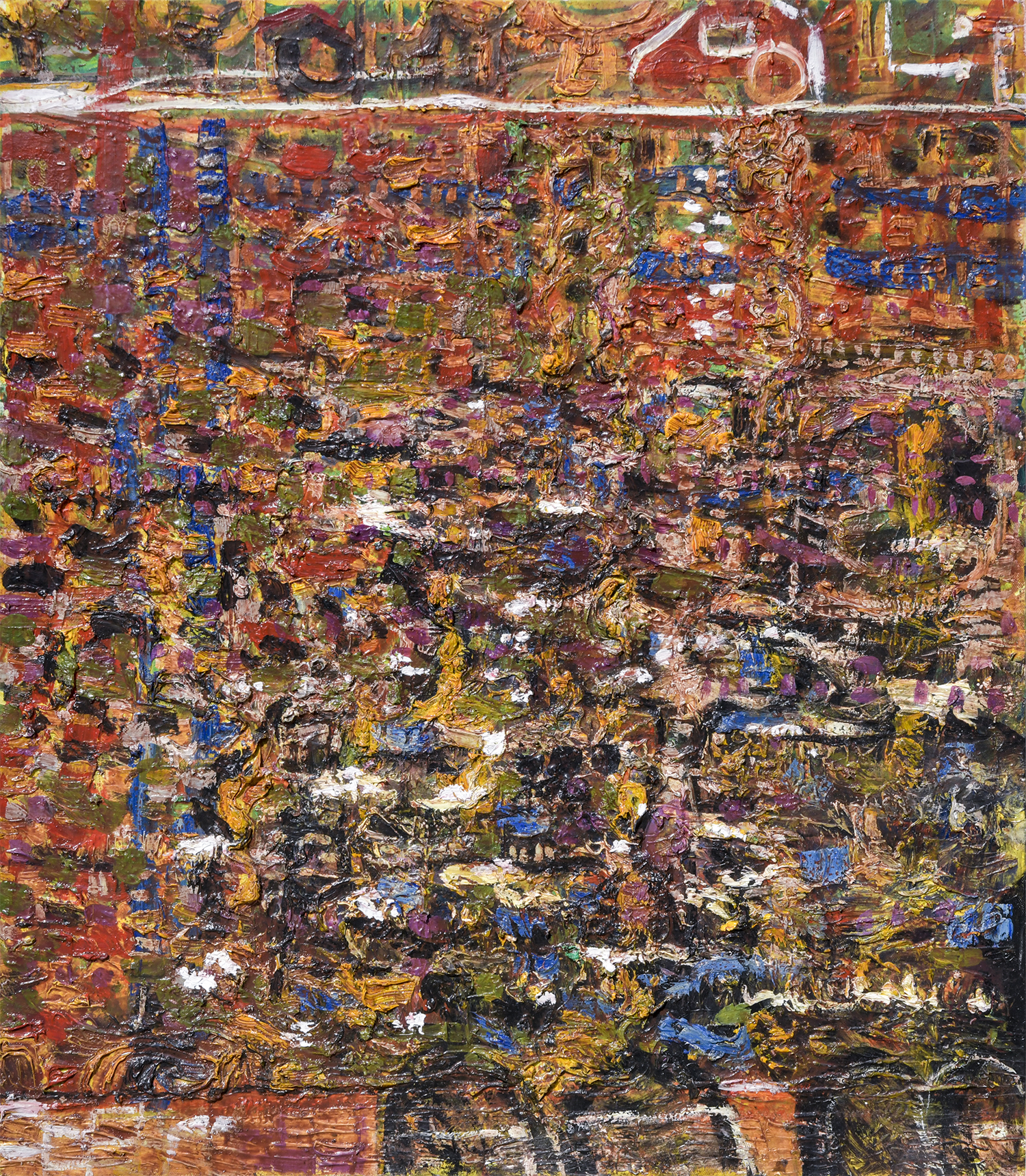
“It felt as if it’s the last moment, and if it’s the last moment as an artist you always feel like you haven’t said it all. And so I think that was it, I wanted to show much more. For an artist, life goes fast and you always feel you weren’t able to tell everything you wanted to say. I missed those moments of life too, and wanted to revive them again.”
Images: Atdhe Mulla / K2.0.
- This story was originally written in Albanian.

